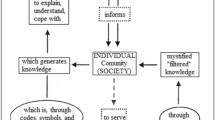Abstract
This paper discusses aspects of a two-year study of a teacher-training course for adult mathematics education organized by a Brazilian landless peoples' social movement. It takes ethnomathematics as a theoretical framework in which cultural differences are central. The paper analyses some of the oral mathematics practices that mark the landless peoples' culture studied. In particular, it discusses a pedagogical process involving the articulation of oral mathematics practices with the use of the calculator, focusing on how pre-service teachers give meaning to their experience and on how cultural differences operated in this setting.
Similar content being viewed by others
References
Behdad, A. (1993): Travelling to teach: postcolonial critics in the American academy.—In: C. McArthy, W. Cricholow (Eds.), Race, identity and representation in education, New York: Routledge, p. 40–49
Bhabha, H. (1994): The location of cultura.—London, New York: Routledge
Carraher, T. N.; Carraher, D. W.; Schliemann, A. D. (1987): Written and oral mathematics.—In: Journal for Research in Mathematics Education, Vol. 18, p. 83~97
Connell, R. W. (1995): Justiça, conhecimento e currículo na educacão contemporânea.—In: L. H. Silva; J. C. Azevedo (Eds.), Reestruturação Curricular—Teoria e prática no cotidiano da escola. Petrópolis: Vozes, p. 11–35.
Denny J. P. (1998): El pensamiento racional en la cultura oral y la descontextualización escrita.—In: D. R. Olson; N. Torrence (Eds.), Cultura escrita e oralidad. Gedisa: Barcelona, Espanha, p. 95–126
Evans, J. (2000). Adults' mathematical thinking and emotions: a study of numerate practices.—London: Routledge
Gay, J.; Cole, M. (1967): The new mathematics and an old culture.—New York: Holt, Rinehart & Winston
Gillings, R. J. (1982). Mathematics in the time of the pharaohs.— New York: Dover Publications.
Graioud, S. (2001): Decolonizing theory: post-tradition as an everyday practice.—Paper presented at the International Conference PostColonialismS/Political correctnesS, Morocco (Africa), April.
Hall, S. (1997) Representation: cultural representation and signifying practice. London: Sage
Hardt, M.; Negri, A. (2000): Empire.—Cambridge, MA: Harvard University Press.
Irons, C. (2001): Mental Computation: how can we do more?—In: Teaching Mathematics 26 (No. 1), p. 22~26
Knijnik, G. (1998): Ethnomathematics and political struggles.—In: ZDM, Zentralblatt für Didaktik der Mathematik 30 (No. 6), p. 119~134
Knijnik, G. (1999): Ethnomathematics and the Brazilian landless people education.—In: ZDM, Zentralblatt für Didaktik der Mathematik 31 (No. 3), p. 188~194
Knijnik, G. (2002a): Ethnomathematics, culture and politics of knowledge in mathematics education.—In: For the Learning of Mathematics 22 (No. 1), p. 11~15
Knijnik, G. (2002b): Curriculum, culture and ethnomathematics: the practices of ‘cubagem of wood’ in the Brazilian landless movement.—In: Journal of intercultural studies 23 (No. 2), p. 149~166
Knijnik, G. (2002c): A perspectiva teórico-metodológica da pesquisa etnomatemática: apontamentos sobre o tema.—VI Encontro Brasileiro de estudantes de Pós-Graduação em Educação Matemática. A Pesquisa em Educação Matemática: Múltiplos Olhares sobre sua produção. Vol. 2. Campinas (São Paulo): Graf: FE, 2002, p. 3–6
Knijnik, G. (2003): Matemática: a etnomatemática na luta pela terra.—In: Caderno de Educação. Educação de Jovens e Adultos 11 (São Paulo: Setor de Educação do MST), p. 72–83
Knijnik, G. (2004): Lessons from research with a social movement. A voice from the South.—In: P. Valero; R. Zevenbergen (Eds.), Researching the socio-political dimensions of mathematics education: issues of power in theory and methodology. Kluwer Academic Publishers: Dordrecht, p. 125–142
Knijnik, G.; Wanderer, F.; Oliveira, C. J. (2004): Etnomatemática, curriculo e formação de professores.—Edunisc: Santa Cruz do Sul, Brasil
Larrosa, J. (2002) Literatura, experiência e formação.—In: M. V. Costa (Ed.), Caminhos investigativos novos olhares na pesquisa em educação. Rio de Janeiro: DP&A, p. 133–160 (entrevista concedida a Alfredo Veiga-Neto)
Lather, P. (1992): Critical frames in educational research feminist and poststructural perspectives.—In: Theory into Practice 31 (No. 2), p. 87~99.
Lather, P. (2003): Applied Derrida: (mis) reading the work of mourning in educational research.—In: Journal of Philosophy in Education 35 (No. 3), p. 257~270
Lave, J. (1985): Introduction: situationally specific practice.—In: Anthropology and Education Quarterly 16 (No. 3), p. 171~176
Lidchi, H. (1997): The poetics and the politics of exhibiting other cultures.—In: S. Hall (Ed.), Representation: cultural representation and signifying practice. London: Sage, p. 151–208
Peet, T. E. (1970): The Rhind mathematical papyrus: introduction, transcription, translation and commentary.—London: Hodder & Stoughton (British Museum 10057 and 10058)
Resnick, L. B. (1983): A developmental theory of number understanding.—In: H. P. Ginsburg (Ed.), The development of mathematical thinking. New York: Academic Press, p. 109–151
Reys, R. E.; Reys, B. J.; McIntosh, A.; Emanuelsson, G.; Johansson, B.; Yang, D.C. (1999) Assessing number sense of students in Australia, Sweden, and the United States. —In: School Science and Mathematics 99 (No. 2), p. 61~70
Rosaldo, R. (1988). Cultura & struth: the remaking of social analysis. Boston, USA: Beacon Press Books
Scribner, S. (1984): Studying working intelligence.—In: B. Rogoff, J. Lave (Eds.), Everyday cognition: its development in social context. Cambridge: Harvard University Press, p. 9–40.
Thompson, I. (2000): British research on mental calculation methods for addition and subtraction.—Preliminary reading for the BERA Symposium, University of Exeter, February.
Tyler, S. A. (1992): La etnografia posmoderna: de documento de lo oculto a documento oculto.—In: C. Geertz; J. Clifford yotros (Eds.), El surgimento de la antropologia posmoderna. Gedisa: Barcelona, Espanha, p. 297–333
Veiga-Neto, A. (1998): Ciência e pós-modernidade.—In: Episteme Vol. 3 (No. 5), p. 43~156
Walkerdine, V. (1988): The mastery of reason.—London: Routledge
Author information
Authors and Affiliations
Rights and permissions
About this article
Cite this article
Knijnik, G., Wanderer, F. & de Oliveira, C.J. Cultural differences, oral mathematics and calculators in a teacher training course of the Brazilian Landless Movement. Zentralblatt für Didaktik der Mathematik 37, 101–108 (2005). https://doi.org/10.1007/BF02655719
Issue Date:
DOI: https://doi.org/10.1007/BF02655719




